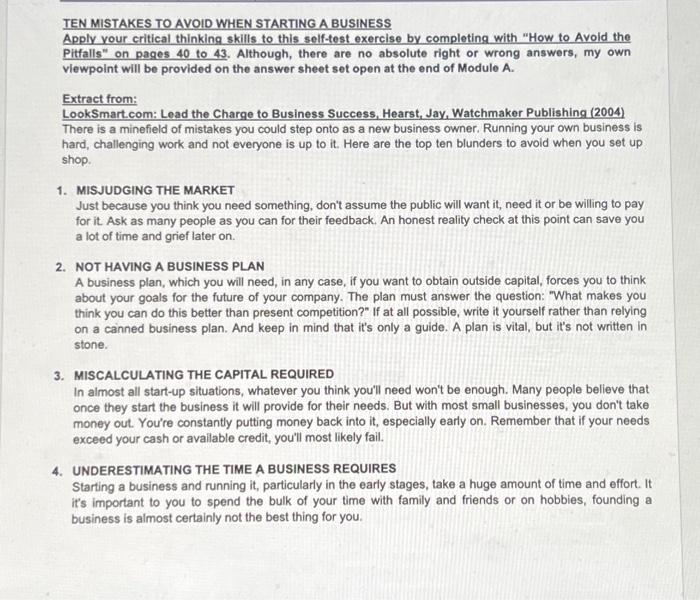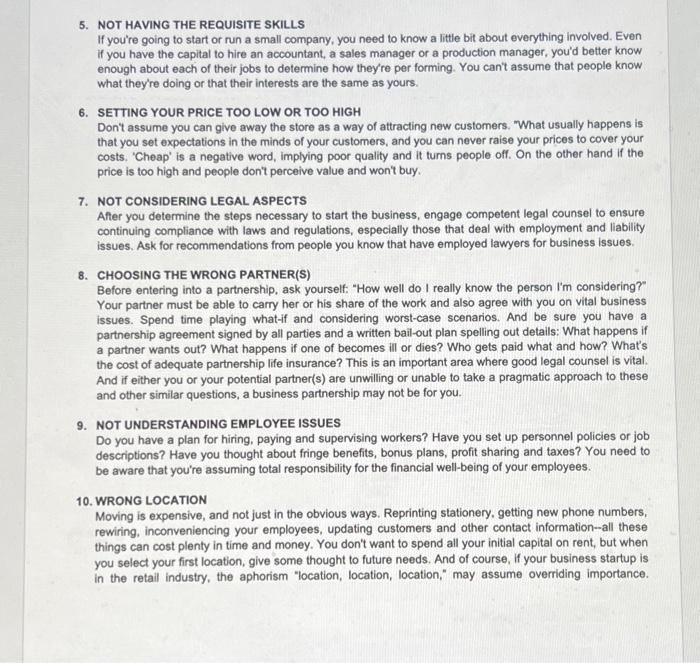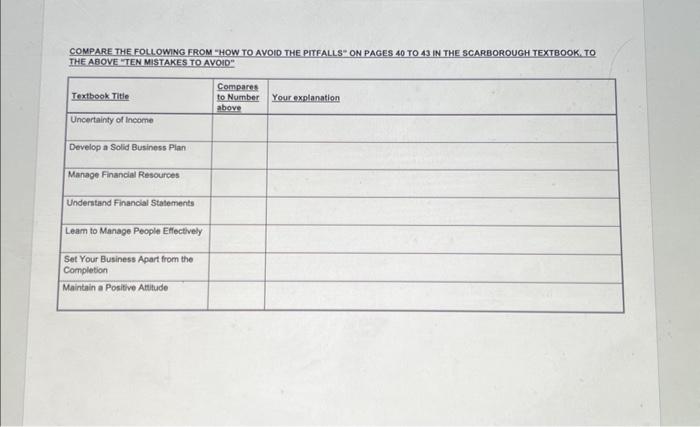TEN MISTAKES TO AVOID WHEN STARTING A BUSINESS Apply your critical thinking skills to this self-test exercise by completing with "How to Avold the Pitfalls" on pages 40 to 43 . Although, there are no absolute right or wrong answers, my own viewpoint will be provided on the answer sheet set open at the end of Module A. Extract from: LookSmartcom: Lead the Charge to Business Success, Hearst, Jay, Watchmaker Publishing (2004) There is a minefield of mistakes you could step onto as a new business owner. Running your own business is hard, challenging work and not everyone is up to it. Here are the top ten blunders to avoid when you set up shop. 1. MISJUDGING THE MARKET Just because you think you need something, don't assume the public will want it, need it or be willing to pay for it. Ask as many people as you can for their feedback. An honest reality check at this point can save you a lot of time and grief later on. 2. NOT HAVING A BUSINESS PLAN A business plan, which you will need, in any case, if you want to obtain outside capital, forces you to think about your goals for the future of your company. The plan must answer the question: "What makes you think you can do this better than present competition?" If at all possible, write it yourself rather than relying on a canned business plan. And keep in mind that it's only a guide. A plan is vital, but it's not written in stone. 3. MISCALCULATING THE CAPITAL REQUIRED In almost all start-up situations, whatever you think you'll need won't be enough. Many people believe that once they start the business it will provide for their needs. But with most small businesses, you don't take money out. You're constantly putting money back into it, especially early on. Remember that if your needs exceed your cash or avaliable credit, you'll most likely fail. 4. UNDERESTIMATING THE TIME A BUSINESS REQUIRES Starting a business and running it, particularly in the early stages, take a huge amount of time and effort. It it's important to you to spend the bulk of your time with family and friends or on hobbies, founding a business is almost certainly not the best thing for you. 5. NOT HAVING THE REQUISITE SKILLS If you're going to start or run a small company, you need to know a little bit about everything involved. Even if you have the capital to hire an accountant, a sales manager or a production manager, you'd better know enough about each of their jobs to determine how they're per forming. You can't assume that people know what they're doing or that their interests are the same as yours. 6. SETTING YOUR PRICE TOO LOW OR TOO HIGH Don't assume you can give away the store as a way of attracting new customers. "What usually happens is that you set expectations in the minds of your customers, and you can never raise your prices to cover your costs. 'Cheap' is a negative word, implying poor quality and it turns people off. On the other hand if the price is too high and people don't perceive value and won't buy. 7. NOT CONSIDERING LEGAL ASPECTS After you determine the steps necessary to start the business, engage competent legal counsel to ensure continuing compliance with laws and regulations, especially those that deal with employment and liability issues. Ask for recommendations from people you know that have employed lawyers for business issues. 8. CHOOSING THE WRONG PARTNER(S) Before entering into a partnership, ask yourself: "How well do I really know the person I'm considering?" Your partner must be able to carry her or his share of the work and also agree with you on vital business issues. Spend time playing what-if and considering worst-case scenarios. And be sure you have a partnership agreement signed by all parties and a written bail-out plan spelling out details: What happens if a partner wants out? What happens if one of becomes ill or dies? Who gets paid what and how? What's the cost of adequate partnership life insurance? This is an important area where good legal counsel is vital. And if either you or your potential partner(s) are unwilling or unable to take a pragmatic approach to these and other similar questions, a business partnership may not be for you. 9. NOT UNDERSTANDING EMPLOYEE ISSUES Do you have a plan for hiring, paying and supervising workers? Have you set up personnel policies or job descriptions? Have you thought about fringe benefits, bonus plans, profit sharing and taxes? You need to be aware that you're assuming total responsibility for the financial well-being of your employees. 10. WRONG LOCATION Moving is expensive, and not just in the obvious ways. Reprinting stationery, getting new phone numbers, rewiring, inconveniencing your employees, updating customers and other contact information-all these things can cost plenty in time and money. You don't want to spend all your initial capital on rent, but when you select your first location, give some thought to future needs. And of course, if your business startup is in the retail industry, the aphorism "location, location, location," may assume overriding importance. COMPARE THE FOLLOWING FROM "HOW TO AVOID THE PITFALLS" ON PAGES 40 TO 43 IN THE SCARBOROUGH TEXTBOOK, TO THE ABOVE "TEN MISTAKES TO AVOID









